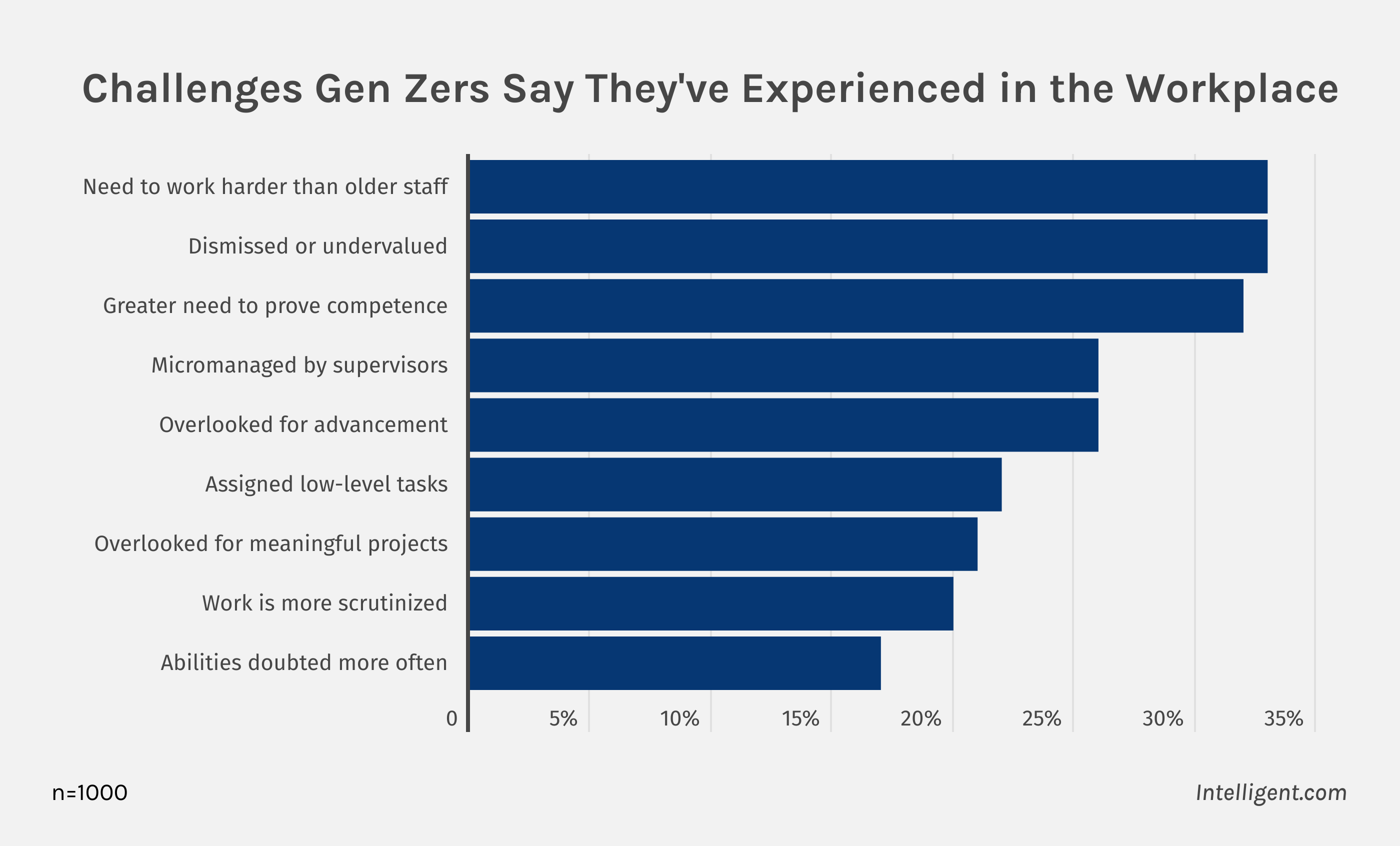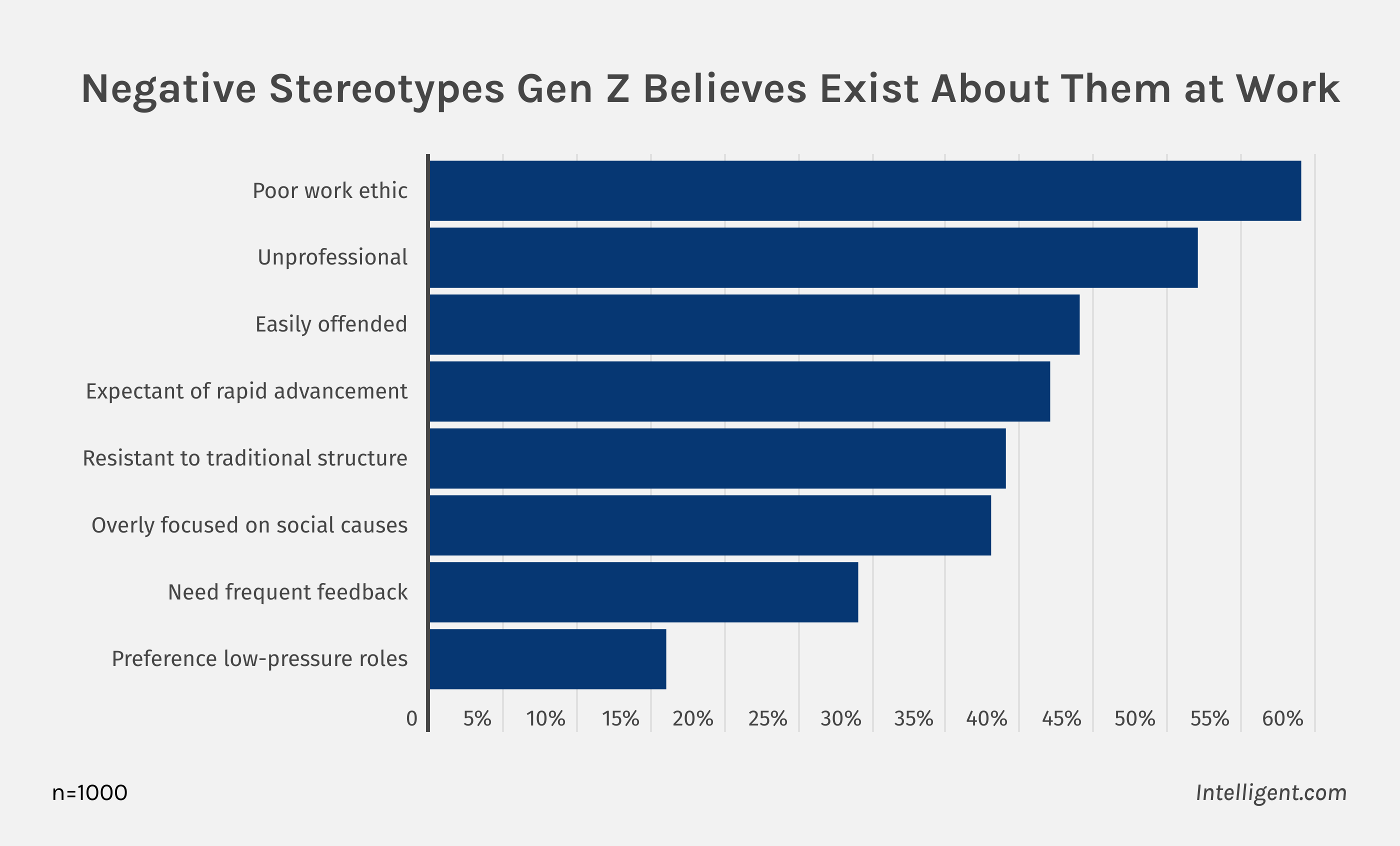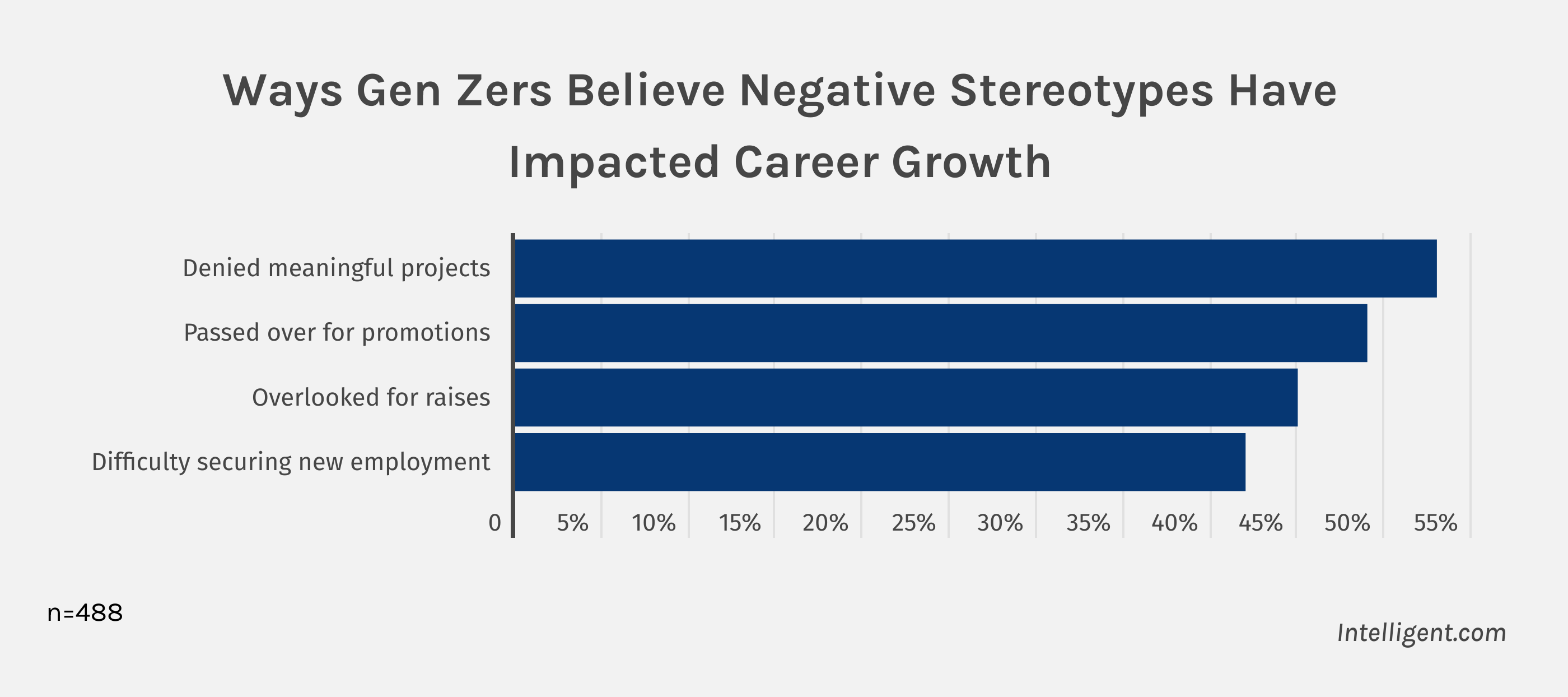Generation Z (Gen Z) knows they’re considered hard to work with, and they’re frustrated about it.
In November, Intelligent.com surveyed 1,000 full-time Gen Z employees to explore how widespread generational stereotypes are impacting Gen Z’s working experience — from career growth to workplace relationships.
What we found:
- 8 in 10 respondents say Gen Z stereotypes have had negative impacts on their work experience
- 48% feel stereotypes have limited their opportunities for career growth; many say they’ve been denied promotions, raises, and opportunities to do meaningful work
- Gen Zers say they have to work unreasonably hard to prove their leadership potential and reliability
- 1 in 5 say Gen Z stereotypes are the cause of tension with older generations
4 in 5 Gen Z Employees Report Negative Stereotypes Affect Their Experience in the Workplace
In the past year, one in three Gen Z employees say they’ve felt dismissed due to pre-existing beliefs about their generation. In fact, most respondents experienced significant challenges in the workplace, such as feeling a greater need to prove their competence compared to older colleagues (32%), or experiencing undesired micromanagement (26%).
Nearly 26% felt excluded from growth or advancement opportunities, 22% found themselves assigned lower-level or “busy work” that seemed to undermine their contributions, 21% felt they had been overlooked for meaningful projects or responsibilities, and 20% reported that their work was scrutinized more closely than that of older colleagues. Many also felt they must work harder just to be taken seriously, with 17% reporting that their managers lacked confidence in their abilities.
These numbers reveal Gen Z employees often feel their contributions are undervalued, and they feel they are going above and beyond to counter negative assumptions about their generation.

Gen Z employees believe they’re seen as “lazy,” “unprofessional,” and “entitled”
A significant majority of Gen Z employees feel they are subject to negative stereotypes, with over half (59%) believing they are perceived as having a poor work ethic. More than half (53%) also feel they’re seen as lacking professionalism, while 44% report that others view them as easily offended or lacking loyalty. They also report being perceived as entitled (42%), resistant to authority (39%), and overly “woke” (38%).

“When employees are unfairly labeled as ‘lazy’ or ‘entitled’ it can be extremely demotivating and contribute to a lack of confidence that may create barriers to new opportunities for them,” says Intelligent’s Chief Education and Career Development Advisor, Huy Nguyen.
“[Gen Z] grew up as digital natives, accustomed to constant connectivity, instant answers, and rapid change, leading them to prioritize flexibility, purpose, and mental well-being. Some may interpret this as a lack of work ethic or professionalism, however, it is often a desire for work-life integration and a rejection of outdated workplace norms.”
Half of Gen Z Employees Say Stereotypes Have Limited Their Career Growth
Nearly 49% of Gen Z employees believe these stereotypes have directly impacted their career growth and advancement. This group feels that negative assumptions about their generation mean they are overlooked for key opportunities, with 53% noting they’ve been excluded from meaningful projects or responsibilities, 49% saying they’ve been passed over for promotions, and 46% reporting they’ve missed out on raises. Additionally, 42% say they’ve had trouble securing new employment.

This perceived bias has led to what many respondents describe as a heightened need to prove themselves beyond what might be expected of older colleagues. To counter negative stereotypes and demonstrate their true capabilities, 46% say they’ve had to work especially hard to demonstrate leadership potential, while others cite additional areas where they feel pressured to overcompensate, such as commitment and reliability (34%), technical skills (33%), and independent work abilities (32%).
1 in 5 Gen Z Employees Experience Tension With Older Coworkers
In addition to career growth challenges, the survey also highlights generational friction in the workplace, with over a third (37%) of Gen Z employees reporting tension with older colleagues. Of this group, 58% believe that negative stereotypes about Gen Z are the root cause.
The stereotypes cause clashes in attitudes or expectations among generations (70%), perceived differences in work styles (67%), and communication challenges (66%).
“The workplace expectation differences between Gen Z and older generations reflect broader trend shifts in how people view work and career development. Gen Z’s work styles and expectations reflect the environment they grew up in emphasizing flexibility, purpose, and technology integration into all aspects of their daily lives. They place more value on their mental well-being and seek careers that align with their personal values,” explains Nguyen.
“Gen Z has grown up with mobile devices and high-speed internet and more often prefers instant messaging and collaborating asynchronously using digital tools. They often prefer quick, informal communication channels over following email strings or formally scheduled meetings. This can clash with older generations’ preferences for more formal workplace communication.”
Methodology
This online poll was commissioned by Intelligent.com and conducted on Pollfish in November 2024. In total, 1,000 full-time Gen Z employees completed the survey.
Demographic criteria and screening questions were used to ensure qualified respondents. This criteria included age (18-27), employment type (full-time), company size (>10), and education (college or postgraduate).